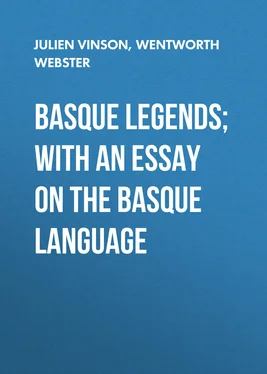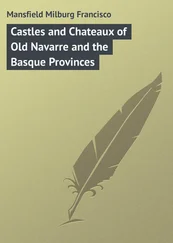Julien Vinson - Basque Legends; With an Essay on the Basque Language
Здесь есть возможность читать онлайн «Julien Vinson - Basque Legends; With an Essay on the Basque Language» — ознакомительный отрывок электронной книги совершенно бесплатно, а после прочтения отрывка купить полную версию. В некоторых случаях можно слушать аудио, скачать через торрент в формате fb2 и присутствует краткое содержание. Жанр: foreign_antique, Старинная литература, Мифы. Легенды. Эпос, на английском языке. Описание произведения, (предисловие) а так же отзывы посетителей доступны на портале библиотеки ЛибКат.
- Название:Basque Legends; With an Essay on the Basque Language
- Автор:
- Жанр:
- Год:неизвестен
- ISBN:нет данных
- Рейтинг книги:3 / 5. Голосов: 1
-
Избранное:Добавить в избранное
- Отзывы:
-
Ваша оценка:
- 60
- 1
- 2
- 3
- 4
- 5
Basque Legends; With an Essay on the Basque Language: краткое содержание, описание и аннотация
Предлагаем к чтению аннотацию, описание, краткое содержание или предисловие (зависит от того, что написал сам автор книги «Basque Legends; With an Essay on the Basque Language»). Если вы не нашли необходимую информацию о книге — напишите в комментариях, мы постараемся отыскать её.
Basque Legends; With an Essay on the Basque Language — читать онлайн ознакомительный отрывок
Ниже представлен текст книги, разбитый по страницам. Система сохранения места последней прочитанной страницы, позволяет с удобством читать онлайн бесплатно книгу «Basque Legends; With an Essay on the Basque Language», без необходимости каждый раз заново искать на чём Вы остановились. Поставьте закладку, и сможете в любой момент перейти на страницу, на которой закончили чтение.
Интервал:
Закладка:
The Tartaro pursues, and is on the point of catching him, when the young man, maddened with fright, and not being able to pull off the ring, takes out his knife, and cuts off his own finger, and throws it away, and thus escapes the pursuit of the Tartaro.
In other versions the young man goes into the forest with some pigs, meets the Tartaro there, is carried by him home, blinds him with the red-hot spit, and escapes by letting himself down through a garret window. The Tartaro pursues, guided by his ring, which at last he throws to the young man to put on, when it cries out as above, and the young man cuts off his finger, and throws it down a precipice or into a bog, where the ring still cries out, and the Tartaro following, is dashed to pieces and drowned.
Errua, the Madman
Like many others in the world, there was a man and woman who had a son. He was very wicked, and did nothing but mischief, and was of a thoroughly depraved disposition. The parents decided that they must send him away, and the lad was quite willing to set off.
He set out then, and goes far, far, far away. He comes to a city, and asks if they want a servant. They wanted one in a (certain) house. He goes there. They settle their terms at so much a month, and that the one who is not satisfied should strip the skin off the other’s back. 13 13 Cf. Campbell’s “Mac-a-Rusgaich,” Vol. II., 305:—“I am putting it into the covenant that if either one of us takes the rue, that a thong shall be taken out of his skin, from the back of his head to his heel.”
The master sends his servant to the forest to get the most crooked pieces of wood that he can find. Near the forest there was a vineyard. What does the servant do but cut it all up, and carries it to the house. The master asks him where the wood is. He shows him the vine-wood cut up. The master said nothing to him, but he was not pleased.
Next day the master says to him, “Take the cows to such a field, and don’t break any hole in the fence.”
What does the lad do? He cuts all the cows into little pieces, and throws them bit by bit into the field. The master was still more angry; but he could not say anything, for fear of having his skin stripped off. So what does he do? He buys a herd of pigs, and sends his servant to the mountain with the herd.
The master knew quite well that there was a Tartaro in this mountain, but he sends him there all the same.
Our madman goes walking on, on, on. He arrives at a little hut. The Tartaro’s house was quite close to his. The pigs of the Tartaro and those of the madman used to go out together. The Tartaro said one day to him—
“Will you make a wager as to who will throw a stone farthest?”
He accepted the wager. That evening our madman was very sad. While he was at his prayers, an old woman appeared to him, and asks him—
“What is the matter with you? Why are you so sad?”
He tells her the wager that he has made with the Tartaro. The old woman says to him—
“If it is only that, it is nothing.”
And so she gives him a bird, and says to him—
“Instead of a stone, throw this bird.”
The madman was very glad at this. The next day he does as the old woman told him. The Tartaro’s stone went enormously far, but at last it fell; but the madman’s bird never came down at all.
The Tartaro was astonished that he had lost his wager, and they make another—which of the two should throw a bar of iron the farthest. The madman accepted again. He was in his little house sadly in prayer. The old woman appears again. She asks him—
“What’s the matter with you?”
“I have made a wager again, which of the two will throw the bar of iron the farthest, and I am very sorry.”
“If it is only that, it is nothing. When you take hold of the bar of iron, say, ‘Rise up, bar of iron, here and Salamanca.’” (Altchaala palenka, hemen eta Salamanka.) 14 14 Salamanca was the reputed home of witchcraft and devilry in De Lancre’s time (1610). He is constantly punning on the word. It is because “Sel y manque,” etc. See also the story of Gerbert, Pope Sylvester II., in the 10th century.
Next day the Tartaro takes his terrible bar of iron, and throws it fearfully far. The young man could hardly lift up one end, and he says—
“Rise up, bar of iron, here and Salamanca.”
When the Tartaro heard that (he cried out)—
“I give up the wager—you have won,” and he takes the bar of iron away from him. “My father and my mother live at Salamanca; don’t throw, I beg of you, I implore you—you will crush them.”
Our madman goes away very happy.
The Tartaro says to him again:
“I will pull up the biggest oak in the forest, and you pull up another.”
He says, “Yes.” And the later it grew in the day, the sadder he became. He was at his prayers. The old woman comes to him again, and says to him—
“What’s the matter with you?”
He tells her the wager he has made with the Tartaro, and how he will pull up an oak. The old woman gives him three balls of thread, and tells him to begin and tie them to all the oaks in the forest. 15 15 This incident is found in Cenac-Moncaut’s Gascon tale, “Le Coffret de la Princesse.” “Litterature Populaire de la Gascogne,” p. 193 (Dentu, Paris, 1868).
Next day the Tartaro pulls up his oak, an enormously, enormously big one; and the madman begins to tie, and to tie, and to tie.
The Tartaro asks him:
“What are you doing that for?”
“You (pulled up) one, but I all these.”
The Tartaro replies,
“No! No! No! What shall I do to fatten my pigs with without acorns? You have won; you have won the wager.”
The Tartaro did not know what to think about it, and saw that he had found one cleverer than himself, and so he asks him if he will come and spend the night at his house.
The madman says, “Yes.”
He goes to bed then with the Tartaro. But he knew that there was a dead man under the bed. When the Tartaro was asleep what does the madman do? He places the dead man by the Tartaro’s side, and gets under the bed himself. In the middle of the night the Tartaro gets up, and takes his terrible bar of iron and showers blows upon blows, ping pan, ping pan, as long and as hard as he could give them.
The Tartaro gets up as usual, and goes to see his pigs, and the madman also comes out from under the bed; and he goes to see the pigs too. The Tartaro is quite astounded to see him coming, and does not know what to think of it. He says to himself that he has to do with a cleverer than he; but he asks him if he has slept well.
He answers, “Yes, very well; only I felt a few flea-bites.”
Their pigs had got mixed, and as they were fat, he had to separate them in order to go away with his. The Tartaro asked the madman what mark his pigs had.
The madman says to him, “Mine have some of them one mark, some of them two marks.”
They set to work to look at them, and they all had these same marks.
Our madman goes off then with all the hogs. He goes walking on, on, on, with all his pigs. He comes to a town where it was just market day, and sells them all except two, keeping, however, all the tails, which he put in his pockets. As you may think, he was always in fear of the Tartaro. He sees him coming down from the mountain. He kills one of his hogs, and puts the entrails in his own bosom under his waistcoat. There was a group of men near the road. As he passed them he took out his knife, and stabs it into his chest, and takes out the pig’s bowels, and our madman begins to run very much faster than before, with his pig in front of him.
When the Tartaro comes up to these men, he asks if they have seen such a man.
Читать дальшеИнтервал:
Закладка:
Похожие книги на «Basque Legends; With an Essay on the Basque Language»
Представляем Вашему вниманию похожие книги на «Basque Legends; With an Essay on the Basque Language» списком для выбора. Мы отобрали схожую по названию и смыслу литературу в надежде предоставить читателям больше вариантов отыскать новые, интересные, ещё непрочитанные произведения.
Обсуждение, отзывы о книге «Basque Legends; With an Essay on the Basque Language» и просто собственные мнения читателей. Оставьте ваши комментарии, напишите, что Вы думаете о произведении, его смысле или главных героях. Укажите что конкретно понравилось, а что нет, и почему Вы так считаете.












